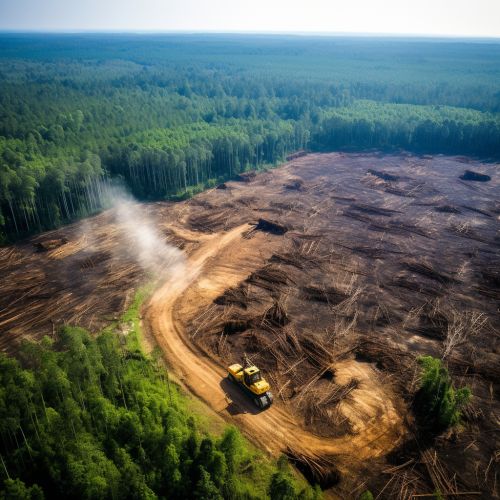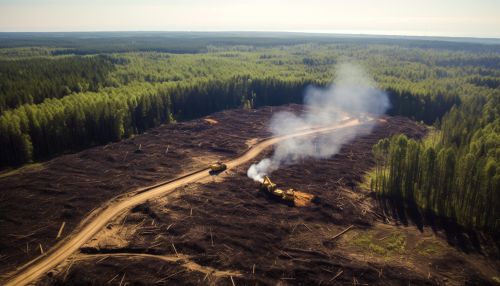Deforestation and Climate Change
Introduction
Deforestation, the permanent removal of trees to make room for something besides forest, is a global issue with significant implications for climate change. It is a complex process driven by various factors, both natural and anthropogenic, and has far-reaching effects on the planet's climate, biodiversity, and human societies.


Causes of Deforestation
Deforestation is primarily caused by human activities, although natural events such as wildfires and pests can also contribute. The main anthropogenic causes include agriculture, logging, and urbanization.
Agriculture
Agriculture is the leading cause of deforestation. As the global population grows, so does the demand for food, leading to the expansion of agricultural land. This often involves clearing forests to make way for crops or livestock. In particular, the cultivation of soybeans, palm oil, and cattle ranching are significant drivers of deforestation, especially in tropical regions.
Logging
Logging, the cutting down of trees for timber or pulp, is another major cause of deforestation. While sustainable logging practices exist, illegal logging and poor regulation often lead to the overexploitation of forests. This is particularly prevalent in countries with rich biodiversity and weak law enforcement.
Urbanization
Urbanization, the process by which rural areas become urban, often leads to deforestation as land is cleared for housing, infrastructure, and industry. As cities expand, so does the demand for land, often at the expense of nearby forests.
Impacts of Deforestation on Climate Change
Deforestation has a profound impact on climate change due to its effect on the global carbon cycle and the role forests play in regulating the Earth's climate.
Carbon Cycle Disruption
Forests act as carbon sinks, absorbing more carbon dioxide (CO2) from the atmosphere than they release. When trees are cut down, they release the stored carbon back into the atmosphere, contributing to the greenhouse effect and global warming. Furthermore, when forests are cleared and the land is used for agriculture or other purposes, the soil may release additional CO2, further exacerbating climate change.
Loss of Climate Regulation
Forests play a crucial role in regulating the Earth's climate. They influence local and global temperatures, rainfall patterns, and wind speeds. By removing large areas of forest, we disrupt these processes, potentially leading to more extreme weather events and changes in climate patterns.
Mitigation and Adaptation Strategies
Addressing deforestation is a critical part of tackling climate change. Strategies to mitigate deforestation and adapt to its impacts include sustainable forest management, reforestation, and policy interventions.
Sustainable Forest Management
Sustainable forest management involves managing forests in a way that maintains their biodiversity, productivity, and ecological processes. This can include practices such as selective logging, where only certain trees are harvested, and agroforestry, where trees are integrated into agricultural systems.
Reforestation and Afforestation
Reforestation, the process of replanting areas where forests have been cut down, and afforestation, the process of planting trees in areas where there were none before, can help restore forests and their climate-regulating functions. These strategies can also help sequester carbon, reducing the amount of CO2 in the atmosphere.
Policy Interventions
Policy interventions can play a crucial role in addressing deforestation. This can include implementing and enforcing laws to protect forests, promoting sustainable land use practices, and providing economic incentives for forest conservation.
Conclusion
Deforestation is a complex issue with significant implications for climate change. Addressing it requires a multifaceted approach, involving sustainable forest management, reforestation, and policy interventions. By understanding the causes and impacts of deforestation, we can work towards solutions that protect our forests and the vital role they play in regulating our planet's climate.
